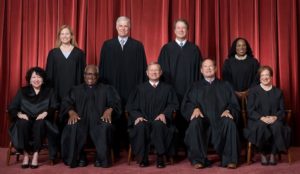U.S. Supreme Court Gives Hamas-Linked CAIR a 9-0 Thumbs-Up
SEE: https://www.jihadwatch.org/2024/03/u-s-supreme-court-gives-hamas-linked-cair-a-9-0-thumbs-up; republished below in full, unedited, for informational, educational, & research purposes:
However, a simple reading of the Supreme Court’s decision in Federal Bureau of Investigation et al. v. Fikre, or of any of the many media reports on that decision, shows that CAIR is overstating the victory.
See, for example, “Supreme Court Says ‘No Fly List’ Suit Can Proceed Against FBI, for Now”, by Jimmy Hoover, Law.com, March 19, 2024. In essence, the court ruled:
Yonas Fikre, a U.S. citizen from Sudan, can—for now—pursue his claim that the FBI violated his constitutional right to due process when it placed him on the list roughly eight years ago. He says the placement left him stranded abroad for four years and led to his torture in the United Arab Emirates.
The government had tried to have Mr. Fikre’s case dismissed as moot, since the FBI had already removed Fikre from the No-Fly list, and as a result, there was no more damage to him. However, the Supreme Court did not accept this reasoning. From FBI vs Fikre:
In May 2016, the government notified Mr. Fikre that he had been removed from the No Fly List and sought dismissal of his suit in district court, arguing that its administrative action had rendered the case moot.”
Mootness is defined in Maniar v. Mayorkas, Civil Action 19-3826 (EGS), 36 (D.D.C. Mar. 30, 2023), as
[a] change in factual circumstances[,] . . . such as when the plaintiff receives the relief sought.
Additionally,
the party urging mootness bears a heavy burden.
However, in the current case, according to FBI vs. Fikre:
The government has failed to demonstrate that this case is moot.
Were the rule more forgiving, a defendant [FBI] might suspend its challenged conduct after being sued, win dismissal, and later pick up where it left off; it might even repeat “this cycle” as necessary until it achieves all of its allegedly “unlawful ends.” Already, 568 U. S., at 91. A live case or controversy cannot be so easily disguised, and a federal court’s constitutional authority cannot be so readily manipulated. To show that a case is truly moot, a defendant must prove “‘no reasonable expectation’” remains that it will “return to [its] old ways.”
The government failed to meet its burden because the declaration did not disclose the conduct that landed Mr. Fikre on the No Fly List and did not ensure that he would not be placed back on the list for engaging in similar or similar conduct in the future.
Again, the court’s ruling means Fikre’s suit against the FBI can continue. But as Justice Gorsuch said in the court’s decision:
The case comes in a preliminary position, framed only by uncontested factual allegations and a terse declaration. As the case unfolds, the complaint’s allegations will be tested rather than taken as true, and different facts may emerge that may call for a different conclusion.
CAIR’s very well-established pattern of overstating the results of court decisions in its favor really should be more widely discussed.
- When Judge Anthony Trenga ruled in CAIR’s favor, saying that the terror watch list was unconstitutional, CAIR hailed this as the greatest legal decision in the history of the country. Indeed, CAIR’s victory was widely reported in the mainstream media. However, when the 4th Circuit Court of Appeals reversed and remanded Judge Trenga’s decision, sending the case back with instructions to rule properly, there was little word from CAIR on that.
- More recently, CAIR was very proud of a favorable ruling in the case A & R Engineering and Testing, Incorporated vs. John Scott, Attorney General of Texas. But CAIR minimized the fact that the judge’s ruling applied to just this one case, and only to the plaintiff, Rasmy Hassouna.
- In the article “Why a Texas Court Ruling on Israel Boycott Was No Victory for CAIR” by Erielle Davidson, which appeared in The Algemeiner on February 4, 2022, there is this statement: “But CAIR is patently wrong in its legal analysis, rendering the recent victory lap is nothing short of bizarre." While the opinion does deem a fraction of the language in the Texas law unconstitutional, the opinion itself explicitly asserts that most of the language in the Texas statute — including the central element prohibiting economic boycotts of Israel — is constitutional.”
CAIR is, among other things, a public relations firm with itself as its biggest client. As a result, any event which is favorable to the organization and its goals is exaggerated out of all proportion, while incidents that do not fit a favorable narrative are whitewashed, hushed up, or simply ignored completely.
Although the FBI is certainly no friend of Jihad Watch, and the terror watch list may be a necessary evil, it does have value. Already, DHS has stopped at least 160 people on the watch list from entering the U.S.’s porous border. Additionally, Project Veritas has reported that many of the Afghan refugees on the terror watch list are roaming free in the U.S.
As Justice Gorsuch wrote in the court’s decision:
The government does not generally disclose the full reasoning for why people are placed on the list, and the Justice Department expressed concerns that allowing cases such as Fikre’s to move forward would needlessly force the government to reveal its sometimes-classified explanations.
Of course, the Hamas-linked Council on American-Islamic Relations appears to have absolutely no regard for the national security of the United States of America.

